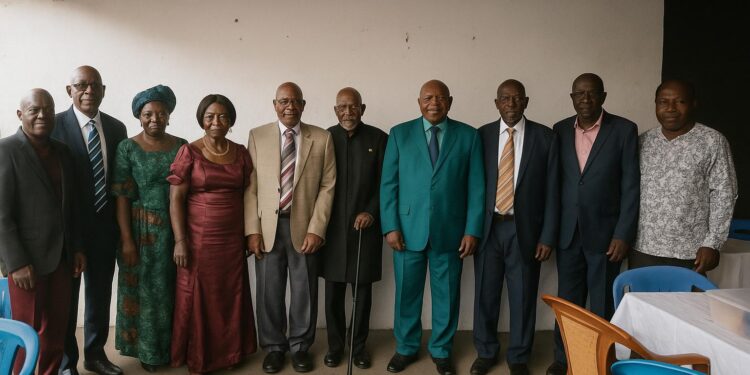Extraordinary Session Highlights Pension Concerns
On 25 October, the Confédération des Retraités Contractuels du Congo convened an extraordinary session in Brazzaville, determined to transform a routine agenda into a roadmap for resolving mounting pension arrears that have strained household consumption and threatened social stability.
The gathering drew delegates from departmental federations, auditors and observers from the National Social Security Fund, underscoring the cross-country relevance of the debate.
CNSS Arrears Loom Over Fiscal Planning
Delegates reiterated that the Fund’s ability to pay current pensions and clear arrears hinges on a government reimbursement estimated at more than CFA 360 billion, a figure repeatedly acknowledged in parliamentary hearings.
Without prompt settlement, union leaders warned of a relapse into the liquidity squeeze seen between 2000 and 2004, a period when pensioners endured uncertain payment schedules and the Fund accumulated interest charges with commercial banks.
Economists following Congolese social accounts note that the arrears largely stem from delayed transfers of payroll contributions collected within the civil service, an issue flagged in the 2023 IMF Staff Report on Republic of Congo public finances.
Draft Budget Sets Tight Timelines
The session approved a provisional budget covering November to December 2025, delineating baseline expenditure for advocacy missions, data audits and legal fees, while reserving contingencies for nationwide outreach if negotiations with the Treasury accelerate.
From January to December 2026, the union will monitor execution through quarterly motions and recommendations, each slated for adoption at ordinary sittings so that deviations can be corrected before liabilities deepen.
Analysts view the two-year window as an implicit countdown for the state to integrate historic obligations into medium-term fiscal frameworks currently being drafted under the 2025–2027 convergence programme within the Central African Economic and Monetary Community.
Governance Refresh to Bolster Negotiations
Delegates reshuffled their confederal council, endorsing a leaner Executive Bureau to improve turnaround time on policy briefs and financial statements.
Guy Noël Mouaya, described by peers as a consensus builder, was elected to coordinate the structure, supported by a vice-president and sectoral secretaries tasked with social dialogue, legal affairs and communications.
Mouaya told reporters that the new team “will privilege constructive engagement with the government, because the pension issue intersects with broader efforts to improve the business climate and domestic demand”.
Macroeconomic Context and Investor Takeaways
The Republic of Congo has stabilised oil revenues and restarted fiscal consolidation, yet public-sector wage and pension arrears remain a watchpoint for credit-rating agencies assessing sovereign risk spreads.
Clearing the CNSS backlog would inject liquidity into retail markets, potentially adding up to 0.3 percentage points to annual GDP growth through increased household consumption, according to a calculation circulated by the national employers’ confederation.
Foreign investors monitoring telecom or construction tenders have highlighted pension arrears as an indirect cost because suppliers often advance payroll commitments that the state later reimburses through social security rebates.
Next Steps on the Policy Calendar
The Executive Bureau will transmit the session’s resolutions to the Prime Minister’s office and the Ministry of Finance before mid-November, requesting a joint technical committee to validate the debt figure and agree on a clearance schedule.
Should talks advance, pensioners expect the first tranche of arrears to be consolidated into the 2025 supplementary budget, with subsequent tranches structured through Treasury bills, an option already used for domestic supplier debt.
Observers caution that timely execution will depend on oil price trajectories and the pace of diversification reforms, yet the session’s disciplined planning signals that social partners want solutions aligned with national development priorities.
Regional Comparisons Offer Lessons
In neighbouring Gabon, the National Pension Fund launched a debt-for-property swap with the state, acquiring administrative buildings in exchange for arrears; CRCC economists are studying that model to evaluate whether similar asset transfers could suit Congo’s legal framework.
Cameroon, by contrast, issued medium-term bonds to refinance pension liabilities, paying coupons below its average domestic rate; bankers in Brazzaville argue that Congo could replicate the auction once its sovereign rating completes the current review.
Digitalisation and Transparency Agenda
The Executive Bureau plans to strengthen data integration between CRCC and CNSS, migrating member files to a biometric platform already piloted for civil servant pay; digital proofs of life are expected to curb fraud and streamline reconciliation with Treasury records.
Tech suppliers suggest the shift could eventually open room for mobile-money disbursements, a service that would benefit pensioners in remote districts and align with the government’s broader financial-inclusion objectives championed by the central bank.
What to Watch Before Year-End
Market analysts will track whether the 2025 draft budget, expected in Parliament next month, explicitly earmarks resources for CNSS arrears; such a line item would reassure investors that fiscal assumptions reflect social liabilities.
Union negotiators also expect the Prime Minister’s economic council to publish a policy note clarifying the hierarchy of domestic debt, which should place pension obligations alongside supplier invoices and tax credits for exporters.
Stakeholder Perspective
The Finance Ministry signalled openness to phased repayment during continuing talks.












































